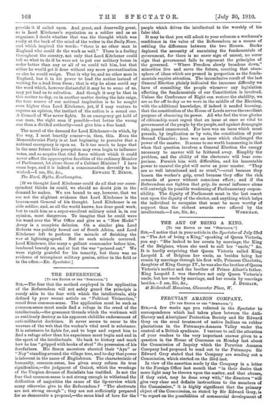THE REFERENDUM.
[To THE EDITOR OP THE "SPECTATOR."] Sin,—The fear that the method employed in the application of the Referendum will not safely guard the principle is surely akin to the fear with which the intellectuals, ably defined by your recent article on "Political Vivisection," recoil from common-sense. The application must be such as common-sense must needs find a refuge in the creed of the intellectuals,—the gossamer threads which the workman will as ruthlessly destroy as his apparent childlike endorsement of anti-militarist doctrines. It never seems to occur to the weavers of the web that the worker's vital need is substance. It is substance he fights for, and to hope and expect him to find a refuge other than his experience must begin and end in the sport of the intellectuals. Go back to history and mark how he has "gripped with hooks of steel" the possession of his forefathers. His Saxon ancestors shouted their "Aye" or "Nay" standing around the village tree, and to-day that power is inherent in the name of Englishman. The characteristic of humanity, common-sense, has given every reform its true signification,—the judgment of Guizot, which the wreckage of the Utopian dreams of Socialists has testified. Is not the fear that common-sense is not strong enough to withstand the deification of majorities the cause of the lip-service which many otherwise give to the Referendum P "The electorate are not strong enough"; they are not sufficiently prepared for so democratic a proposal,—the same kind of love for the
people which drives the intellectual to the worship of his false idol.
It may be that you will admit to your columns a workman's confidence in the value of the Referendum as a means of settling the difference between the two Houses. Burke deplored the necessity of examining the fundamentals of government, for there is no surer sign of unrest, no surer sign that government fails to represent the principles of the governed. " Where Freedom slowly broadens down," minorities live and serve the future, creating that atmo- sphere of ideas which are pruned in proportion as the funda- mentals require attention. The inconclusive result of the last. General Election plainly indicated the immense difficulty we have of consulting the people whenever any legislation affecting the fundamentals of our Constitution is involved. Unless the Conference of Eight can restore the stability, we are as far off to-day as we were in the middle of the Election, with the additional knowledge, if indeed it needed learning, that the constitution of the House of Lords serves the excellent purpose of obscuring its power. All who feel the true glories of citizenship must regret that an issue at once so vital to government of the people by the people, and against demagogic rule, passed unanswered. For here was an issue which must precede, by implication or by vote, the constitution of your Second Chamber; here was an issue which challenged the power of the master. It seems to me worth hammering in that when that question involves a General Election the energy necessary to answer will be frittered away. Simplify the problem, and the ability of the electorate will bear com- parison. Furnish him with difficulties, and his lamentable power to unravel the plot will serve as your master. "They are so well intentioned and so cruel,"—cruel because they loosen the worker's grip, cruel because they offer the rich rewards of power without conscious effort; and if the Referendum can tighten that grip, its moral influence alone will outweigh its possible weakening of Parliamentary respon- sibility. The dignity of Parliament must in the last resort rest upon the dignity of the elector, and anything which helps the individual to recognise that must be more worthy of support than the richest awards ever offered by the






































 Previous page
Previous page